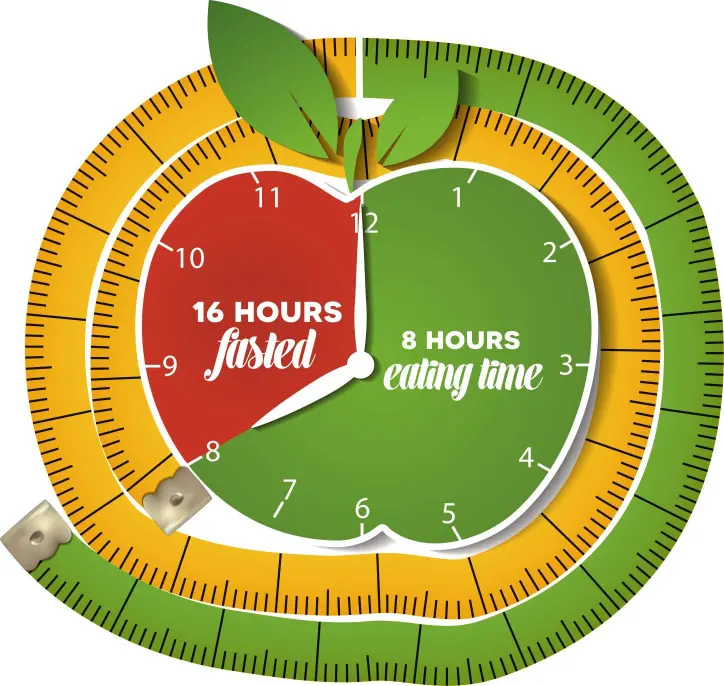August 9, 2019
Intermittent fasting (IF) is currently one of the world’s most popular health and fitness trends.
People are using it to lose weight, improve their health and simplify their lifestyles.
Many studies show that it can have powerful effects on your body and brain and may even help you live longer.
What Is Intermittent Fasting (IF)?
Intermittent fasting (IF) is an eating pattern that cycles between periods of fasting and eating.
It doesn’t specify which foods you should eat, but rather when you should eat them.
In this respect, it’s not a diet in the conventional sense, but more accurately described as an eating pattern.
Common intermittent fasting methods involve daily 16-hour fasts or fasting for 24 hours, twice per week.
Fasting has been a practice throughout human evolution. Ancient hunter-gatherers didn’t have supermarkets, refrigerators or food available year-round. Sometimes they couldn’t find anything to eat.
As a result, humans evolved to be able to function without food for extended periods of time.
In fact, fasting from time to time is more natural than always eating 3–4 (or more) meals per day.
Fasting is also often done for religious or spiritual reasons, including in Islam, Christianity, Judaism, and Buddhism.
Intermittent Fasting Methods
There are several different ways of doing intermittent fasting — all of which involve splitting the day or week into eating and fasting periods.
During the fasting periods, you eat either very little or nothing at all.
These are the most popular methods:
- The 16/8 method: Also called the Lean gains protocol, it involves skipping breakfast and restricting your daily eating period to 8 hours, such as 1–9 p.m. Then you fast for 16 hours in between.
- Eat-Stop-Eat: This involves fasting for 24 hours, once or twice a week, for example by not eating from dinner one day until dinner the next day.
- The 5:2 diet: With this methods, you consume only 500–600 calories on two non-consecutive days of the week, but eat normally the other 5 days.
By reducing your calorie intake, all of these methods should cause weight loss as long as you don’t compensate by eating much more during the eating periods.
Many people find the 16/8 method to be the simplest, most sustainable and easiest to stick to. It’s also the most popular.
How It Affects Your Cells and Hormones
When you fast, several things happen in your body at the cellular and molecular level.
For example, your body adjusts hormone levels to make the stored body fat more accessible.
Your cells also initiate important repair processes and change the expression of genes.
Here are some changes that occur in your body when you fast:
- Human Growth Hormone (HGH): The levels of growth hormone skyrocket, increasing as much as 5-fold. This has benefits for fat loss and muscle gain, to name a few
- Insulin: Insulin sensitivity improves and levels of insulin drop dramatically. Lower insulin levels make stored body fat more accessible
- Cellular repair: When fasted, your cells initiate cellular repair processes. This includes autophagy, where cells digest and remove old and dysfunctional proteins that build up inside cells
- Gene expression: There are changes in the function of genes related to longevity and protection against disease these changes in hormone levels, cell function and gene expression are responsible for the health benefits of intermittent fasting.
A Very Powerful Weight Loss Tool
Weight loss is the most common reason for people to try intermittent fasting by making you eat fewer meals, intermittent fasting can lead to an automatic reduction in calorie intake.
Additionally, intermittent fasting changes hormone levels to facilitate weight loss.
In addition to lowering insulin and increasing growth hormone levels, it increases the release of the fat-burning hormone norepinephrine (noradrenaline).
Because of these changes in hormones, short-term fasting may increase your metabolic rate by 3.6–14%
By helping you eat fewer and burn more calories, intermittent fasting causes weight loss by changing both sides of the calorie equation.
Studies show that intermittent fasting can be a very powerful weight-loss tool.
A 2014 review study found that this eating pattern can cause 3–8% weight loss over 3–24 weeks, which is a significant amount, compared to most weight loss studies.
According to the same study, people also lost 4–7% of their waist circumference, indicating a significant loss of harmful belly fat that builds up around your organs and causes disease.
Another study showed that intermittent fasting causes less muscle loss than the more standard method of continuous calorie restriction.
However, keep in mind that the main reason for its success is that intermittent fasting helps you eat fewer calories overall. If you binge and eat massive amounts during your eating periods, you may not lose any weight at all.
Health Benefits
Many studies have been done on intermittent fasting, in both animals and humans.
These studies have shown that it can have powerful benefits for weight control and the health of your body and brain. It may even help you live longer.
Here are the main health benefits of intermittent fasting:
- Weight loss: As mentioned above, intermittent fasting can help you lose weight and belly fat, without having to consciously restrict calories.
- Insulin resistance: Intermittent fasting can reduce insulin resistance, lowering blood sugar by 3–6% and fasting insulin levels by 20–31%, which should protect against type 2 diabetes
- Inflammation: Some studies show reductions in markers of inflammation, a key driver of many chronic diseases
- Heart health: Intermittent fasting may reduce “bad” LDL cholesterol, blood triglycerides, inflammatory markers, blood sugar and insulin resistance — all risk factors for heart disease.
- Cancer: Animal studies suggest that intermittent fasting may prevent cancer.
- Brain health: Intermittent fasting increases the brain hormone BDNF and may aid the growth of new nerve cells. It may also protect against Alzheimer’s disease.
- Anti-aging: Intermittent fasting can extend lifespan in rats. Studies showed that fasted rats lived 36–83% longer.
Keep in mind that research is still in its early stages. Many of the studies were small, short-term or conducted in animals. Many questions have yet to be answered in higher quality human studies.
Makes Your Healthy Lifestyle Simpler
Eating healthy is simple, but it can be incredibly hard to maintain.
One of the main obstacles is all the work required to plan for and cook healthy meals.
Intermittent fasting can make things easier, as you don’t need to plan, cook or clean up after as many meals as before.
For this reason, intermittent fasting is very popular among the life-hacking crowd, as it improves your health while simplifying your life at the same time.
Who Should Be Careful Or Avoid It?
Intermittent fasting is certainly not for everyone.
If you’re underweight or have a history of eating disorders, you should not fast without consulting with a health professional first.
In these cases, it can be downright harmful.
Should Women Fast?
There is some evidence that intermittent fasting may not be as beneficial for women as it is for men.
For example, one study showed that it improved insulin sensitivity in men, but worsened blood sugar control in women.
Though human studies on this topic are unavailable, studies in rats have found that intermittent fasting can make female rats emaciated, masculinized, infertile and cause them to miss cycles.
There are a number of anecdotal reports of women whose menstrual period stopped when they started doing IF and went back to normal when they resumed their previous eating pattern.
For these reasons, women should be careful with intermittent fasting.
They should follow separate guidelines, like easing into the practice and stopping immediately if they have any problems like amenorrhea (absence of menstruation).
If you have issues with fertility and/or are trying to conceive, consider holding off on intermittent fasting for now. This eating pattern is likely also a bad idea if you’re pregnant or breastfeeding.
Safety and Side Effects
Hunger is the main side effect of intermittent fasting.
You may also feel weak and your brain may not perform as well as you’re used to.
This may only be temporary, as it can take some time for your body to adapt to the new meal schedule.
If you have a medical condition, you should consult with your doctor before trying intermittent fasting.
This is particularly important if you:
- Have diabetes.
- Have problems with blood sugar regulation.
- Have low blood pressure.
- Take medications.
- Are underweight.
- Have a history of eating disorders.
- Are a woman who is trying to conceive.
- Are a woman with a history of amenorrhea.
- Are pregnant or breastfeeding.
All that being said, intermittent fasting has an outstanding safety profile. There is nothing dangerous about not eating for a while if you’re healthy and well-nourished overall.
Source – https://www.healthline.com/nutrition/intermittent-fasting-guide




















